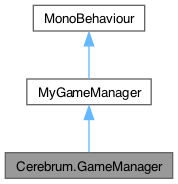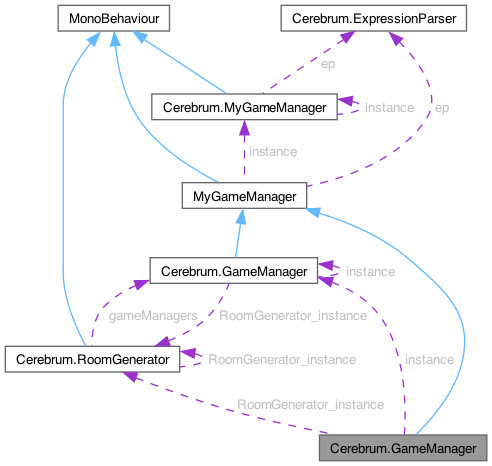|
| static void | StartScenario () |
| | StartScenario is a public function that allows another script to start the scene's scenario (RoomGenerator starts this function once all room objects have finished spawning in).
|
| |
| static void | ObjectCreated (GameObject createdGO) |
| | Object Created function called after Level Generator verifies that a dynamic object requested to be created by the Game Manager has finished spawning into the scene.
|
| |
| static GameObject | FindThisObject (string objName) |
| | FindThisObject finds a single game object. Public function that should be used for object finding by other scripts, such as message handlers. Returns a reference to the game object searched for. Function first checks room object inventory managed by RoomGenerator, then searches by name if object not in room inventory. Returns null if object not found.
|
| |
| static GameObject | FindInaciveGameObject (string objName) |
| | Find game object even if it is inactive.
|
| |
|
| override void | Awake () |
| |
| override void | Start () |
| | Start function ensures that EventSystem and PhysicsRaycaster are both in scene so that IPointer events will function properly and user can click on objects in the scene. Also creates new Expression Parser object.
|
| |
| override bool | processObjectsCommand (string objName, string command, string cparams, out string retString) |
| | processObjectsCommand processes commands meant for multiple objects. Supports ANY and ALL patterns. e.g.: Lights/ALL
|
| |
| GameObject[] | FindGameObjects (string objName) |
| |
| bool | CheckForDebugCanvas () |
| |
| virtual void | Awake () |
| |
| virtual void | Start () |
| |
| IEnumerator | executeScenarioFiles (string[] fileNames) |
| |
| virtual bool | processObjectsCommand (string objName, string command, string cparams, out string retString) |
| |
| bool | processObjectCommand (GameObject go, string command, string cparams, out string retString) |
| | Send a GameObject command to appropriate GameObject(s)
|
| |
|
| GameObject | gameObject [get, set] |
| |
| AsyncOperationHandle< GameObject > | handle [get, set] |
| |
◆ Awake()
| override void Cerebrum.GameManager.Awake |
( |
| ) |
|
|
protectedvirtual |
◆ CreateObject()
| override IEnumerator Cerebrum.GameManager.CreateObject |
( |
string |
objPrefabName | ) |
|
|
virtual |
◆ ExecuteScenario()
| void Cerebrum.GameManager.ExecuteScenario |
( |
| ) |
|
◆ FindGameObject()
| override GameObject Cerebrum.GameManager.FindGameObject |
( |
string |
objName | ) |
|
|
virtual |
◆ FindGameObjects()
| GameObject[] Cerebrum.GameManager.FindGameObjects |
( |
string |
objName | ) |
|
|
protected |
◆ FindThisObject()
| static GameObject Cerebrum.GameManager.FindThisObject |
( |
string |
objName | ) |
|
|
static |
FindThisObject finds a single game object. Public function that should be used for object finding by other scripts, such as message handlers. Returns a reference to the game object searched for. Function first checks room object inventory managed by RoomGenerator, then searches by name if object not in room inventory. Returns null if object not found.
◆ ObjectCreated()
| static void Cerebrum.GameManager.ObjectCreated |
( |
GameObject |
createdGO | ) |
|
|
static |
Object Created function called after Level Generator verifies that a dynamic object requested to be created by the Game Manager has finished spawning into the scene.
◆ processObjectsCommand()
| override bool Cerebrum.GameManager.processObjectsCommand |
( |
string |
objName, |
|
|
string |
command, |
|
|
string |
cparams, |
|
|
out string |
retString |
|
) |
| |
|
protectedvirtual |
processObjectsCommand processes commands meant for multiple objects. Supports ANY and ALL patterns. e.g.: Lights/ALL
Reimplemented from Cerebrum.MyGameManager.
◆ Start()
| override void Cerebrum.GameManager.Start |
( |
| ) |
|
|
protectedvirtual |
Start function ensures that EventSystem and PhysicsRaycaster are both in scene so that IPointer events will function properly and user can click on objects in the scene. Also creates new Expression Parser object.
Reimplemented from Cerebrum.MyGameManager.
◆ StartScenario()
| static void Cerebrum.GameManager.StartScenario |
( |
| ) |
|
|
static |
StartScenario is a public function that allows another script to start the scene's scenario (RoomGenerator starts this function once all room objects have finished spawning in).
◆ instance
◆ RoomGenerator_instance
◆ selfStart
| bool Cerebrum.GameManager.selfStart = false |
◆ gameObject
| GameObject Cerebrum.GameManager.gameObject |
|
getset |
◆ handle
| AsyncOperationHandle<GameObject> Cerebrum.GameManager.handle |
|
getset |
The documentation for this class was generated from the following file:




 Public Member Functions inherited from Cerebrum.MyGameManager
Public Member Functions inherited from Cerebrum.MyGameManager Static Public Member Functions inherited from Cerebrum.MyGameManager
Static Public Member Functions inherited from Cerebrum.MyGameManager Public Attributes inherited from Cerebrum.MyGameManager
Public Attributes inherited from Cerebrum.MyGameManager Static Public Attributes inherited from Cerebrum.MyGameManager
Static Public Attributes inherited from Cerebrum.MyGameManager Protected Member Functions inherited from Cerebrum.MyGameManager
Protected Member Functions inherited from Cerebrum.MyGameManager Static Protected Member Functions inherited from Cerebrum.MyGameManager
Static Protected Member Functions inherited from Cerebrum.MyGameManager Protected Attributes inherited from Cerebrum.MyGameManager
Protected Attributes inherited from Cerebrum.MyGameManager


